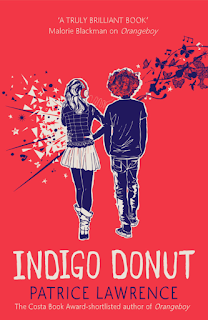 |
| We spent hours getting our costumes right! |
Of course the lyrics of the song sung by the Munchkins from The Wizard of Oz film, when Dorothy's house lands in Oz and kills the Wicked Witch, actually go like this:
We thank you very sweetly for doing it so neatly
You've killed her so completely,
That we thank you very sweetly
You've killed her so completely,
That we thank you very sweetly
Not exactly what we meant. What we at Notes from the Slushpile really want to say this lovely season – sweetly – is:
Thank You
... for being such kind, loyal readers in 2017!
We thought we would each offer you our book of the year and a top tip ... so here goes ...
 PAULA HARRISON my book of the year was Letters from the Lighthouse by Emma Carroll which is a fantastic piece of historical fiction with themes of tolerance and friendship all wrapped up in a page-turning mystery.
PAULA HARRISON my book of the year was Letters from the Lighthouse by Emma Carroll which is a fantastic piece of historical fiction with themes of tolerance and friendship all wrapped up in a page-turning mystery.Top tip: Keep trying different things, meeting new people, making new connections. At a time when the market is asking you for more of the same, writing something different on the side will keep you sane and who knows where it may lead!
ADDY FARMER Five Children on the Western Front by Kate Saunders. This was the book with a heart, worn feather-light on its sleeve. I loved how Saunders managed the delicate balance of funny stuff and profound sadness with the best, most wonderfully sad and satisfying ending EVER.
And my tip? Write who you are and don't strain to find who you think you ought to be. I love to write sad stuff and I love to write funny and that is what I'm finally doing. Enjoy!
KATHRYN EVANS My book recommendation is Wonder by RJ Palacio, an absolute masterclass in character and how to control your readers emotions... I know I'm five years behind the curve but my TBR pile is HUGE.
And my top tip is to set yourself writing targets – 500 words a day is honestly achievable no matter what else you are doing. In two months you'd have 30,000 words!
NICK CROSS I know that elsewhere in this article, Kathryn Evans complains of being off the zeitgeist. Well, the book that I found most inspiring this year wasn’t even published this century! But, reading The Perks of Being a Wallflower by Stephen Chbosky made me realise that it was OK to write a sweet but emotional coming of age story set in the 1990s. So I am!
Tip: Do something that scares you. And then another thing. This year, I have taken to the stage, decided to self-publish, begun learning to draw and come out as an author/illustrator. Frankly, it has all been rather terrifying, but I did it anyway. I’m not sure if that makes me brave or just stupid!
TERI TERRY My book of the year is Indigo Donut by Patrice Lawrence. It was far out of the usual stuff I'd read and I'm glad I got to know Indigo and Bailey: gut wrenching, realistic and ultimately hopeful.
My top tip: get a puppy! Being a full time writer it is easy to become isolated and to spend too much time in your own head - which isn't healthy for anyone. She's not doing much for my word count, but isn't Scooby ADORABLE?
EM LYNAS My book of the year is The Tale of Angelino Brown by David Almond and illustrated by Alex T Smith. A gentle story about an angel who appears in Bert Brown's top pocket one day and goes on to change everyone's lives in a warm and humorous way. The language was so beautifully understated and my favourite repetitive phrase was Angelino's, "I know nowt." To quote my daughter, "It's a hug in a book." I wish I'd written it.
My top tip for writers is - join SCBWI and build an amazing group of friends and supporters who are willing to go daft and don silly hats on the publication day of your very first children's novel. As a surprise. It was a day of laughter and fun. I thank them all xxx




CANDY GOURLAY My book of the year is one I can't help looking at every chance I get. Town is by the Sea by Joanne Schwartz and Sydney Smith, a story of very few words and yet encompassing a life, its tragedies and the love that sustains it. And Sydney Smith's sparkling illustrations. I adore it.
My top tip: my battle this year has been with the distractions that, like demons, needle me every time I look up from my writing. The meditation app Headspace recommends: "Know what you're doing next." So during any pause in my writing time, whether it's to go to the bathroom or answer a phone call or to have a quick look at Facebook, I scribble down what I'm doing next. It has really helped!
See you next year!




















































